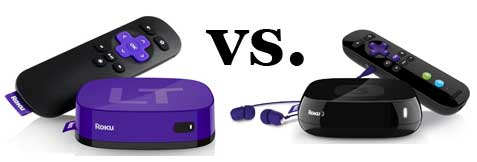The Roku 3 is currently the top-of-the-line model, while the Roku LT is the most affordable. But while the Roku 3 has almost every feature that you might ask for from a set-top streaming device, not everyone needs all of those features. So continue reading below to see what the Roku 3 offers over the Roku LT so that you can decide if you value the Roku 3’s features more, or if you think the lower price of the Roku LT makes it the right choice for you. As you can see from the chart above, the Roku 3 has a lot more to offer than the Roku LT. But these additional options come with a price tag, so continue reading below to determine if the device upgrade is worth the added cost.
Some Roku 3 Advantages
The Roku 3 was released much later than the Roku LT, and the fact that it is the newer device means that it has a better processor and wireless card. This results in a faster interface, better Wi-Fi connection and, in general, just better performance. The Roku LT is not slow, but the Roku 3 is noticeably faster. The improved speed and performance of the Roku 3 are a result of it being a newer model, but there are some added benefits of the dual-band wireless on the Roku 3. If your Roku is being connected to a TV that is far from your wireless router, or in a room that doesn’t get a good wireless signal, you will get better reception with the Roku 3 than you will with the Roku LT. The Roku 3 can stream content in 1080p, while the Roku LT is limited to 720p streaming. Both options are high-def, but some people notice a considerable difference between 1080p and 720p. There are more ports on the Roku 3 as well, including a USB port and an ethernet port. The Roku 3 can connect to your home network either wirelessly or with an ethernet cable, while the Roku LT is limited to a wireless Internet connection. The USB port on the Roku 3 also allows you to connect a USB flash drive or external hard drive and play content from there, in addition to streaming content. The ability to play games and listen to audio through the headphone jack on the remote control are convenient as well, especially if you envision yourself using either of those features a lot.
Some Roku LT Advantages
The biggest draw for the Roku LT is its’ price. If neither product is on sale, then the Roku LT is half the price of the Roku 3. For someone that is in search of a simple, cheap device to stream Netflix, then the lower price is a big attraction. The Roku LT also offers the option of connecting to a TV with composite video cables, which is not an option on the Roku 3. So if you are looking to add a Roku to a basement, garage or second bedroom TV for some additional viewing option, and that TV doesn’t have an HDMI input, then the Roku LT would be the clear choice.
Conclusion
If you are intending to use the Roku as a primary entertainment source and don’t want to replace it next year when a new model comes out, then the Roku 3 is probably your best option. Its’ hardware will allow it to remain competitive at least through the next generation, whereas you may start wishing for better performance from your Roku LT when you start reading reviews of the Roku 4. The additional bells and whistles on the Roku 3 are also enticing, and the USB port and ethernet port are important enough to be the deciding factor for many users. If you are just looking for a simple solution to watch Netflix, or if you are intending to put it in a room where it won’t be watched a lot, then the lower price of the Roku LT can make it the more attractive choice. Especially if you don’t think you will need or use the additional features available on the Roku 3. Both of these are great devices, so the best way to make your choice is to be realistic about what you are going to use it for, then determine which one has all of the options that you need. You can also read our comparison of the Roku 2 XD and the Roku 3, as well as our comparison of the Roku 3 and the Roku HD. After receiving his Bachelor’s and Master’s degrees in Computer Science he spent several years working in IT management for small businesses. However, he now works full time writing content online and creating websites. His main writing topics include iPhones, Microsoft Office, Google Apps, Android, and Photoshop, but he has also written about many other tech topics as well. Read his full bio here.
























